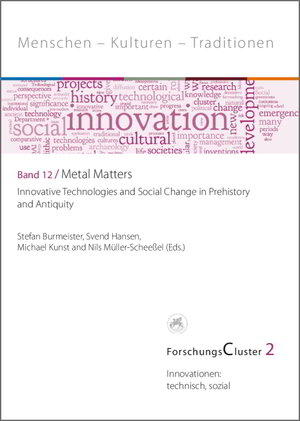
×
![Buchcover ISBN 9783867573924]()
ForschungsCluster 2 / Metal Matters
Innovationen: technisch, sozial / Innovative Technologies and Social Change in Prehistory and Antiquity
herausgegeben von Stefan Burmeister, Svend Hansen, Michael Kunst und Nils Müller-ScheeßelHeute ist Metall ein Werkstoff, ohne den das tägliche Leben in Industrienationen unvorstellbar wäre, obwohl es eine relativ junge Innovation darstellt, die nur ins frühe 5. Jt. v. Chr. zurückreicht. Die Beiträge des Sammelbandes gehen auf Workshops der Studiengruppe “Metall” des DAI-Clusters 2 zurück, die 2007 in Madrid, 2008 in Torres Vedras und 2009 in Almería stattfanden. Auf eine Einführung folgen Aufsätze zu Rohmaterialversorgung und sozialer Entwicklung Ägyptens im 4. Jt., chalkolithischer Metallurgie der südlichen Levante im 5./4. Jt., prähistorischem Bergbau und Metallproduktion in Jordanien, Kupfermetallurgie auf dem Sinai, frühe Metallurgie im Iran, Kupfer, Gold und Silber im Schwarzmeergebiet und dem Karpatenbecken im 5./4. Jt., früher Metallerzeugung im nordalpinen Raum, Kupfermetallurgie und sozialer Komplexität auf der Iberischen Halbinsel im 3. Jt., technologischen und sozialen Mustern metallurgischer Innovationen ebenda, der Entwicklung der Metallurgie ebenda, dem römischen Munizipium von Munigua und dem Bergbau im hispanischen Südwesten, römischen Bergbauinnovationen auf der Iberischen Halbinsel sowie zu römischer Bleigewinnung.
Today metal is a substance without which everyday life in the industrial nations would be unthinkable, and still metallurgy is a relatively recent innovation only dating back to the early 5th mill. B. C. The papers of this volume are products of several workshops of the study group “Metal” of DAI-Cluster 2 held in Madrid in 2007, Torres Vedras in 2008, and Almería in 2009. An introduction by the editors is followed by articles on raw material supply and social development in 4th-mill. Egypt, Chalcolithic metallurgy in the Southern Levant in the 5th/4th mill., prehistoric mining and metal production in Jordan, copper metallurgy in Sinai, early metallurgy in Iran, copper, gold, and silver in the Black Sea Region and the Carpathian Basin in the 5th/4th mill., early metal production in the Northern Alpine Region, copper metallurgy and social complexity on the Iberian Peninsula in the 3rd mill., the technological and social patterns of innovation in metallurgy on the Iberian Peninsula, the development of metallurgy on the Iberian Peninsula, the Roman municipium of Munigua and mining in the Hispanic south-west, Roman mining innovations on the Iberian Peninsula, as well as Roman lead production.
Today metal is a substance without which everyday life in the industrial nations would be unthinkable, and still metallurgy is a relatively recent innovation only dating back to the early 5th mill. B. C. The papers of this volume are products of several workshops of the study group “Metal” of DAI-Cluster 2 held in Madrid in 2007, Torres Vedras in 2008, and Almería in 2009. An introduction by the editors is followed by articles on raw material supply and social development in 4th-mill. Egypt, Chalcolithic metallurgy in the Southern Levant in the 5th/4th mill., prehistoric mining and metal production in Jordan, copper metallurgy in Sinai, early metallurgy in Iran, copper, gold, and silver in the Black Sea Region and the Carpathian Basin in the 5th/4th mill., early metal production in the Northern Alpine Region, copper metallurgy and social complexity on the Iberian Peninsula in the 3rd mill., the technological and social patterns of innovation in metallurgy on the Iberian Peninsula, the development of metallurgy on the Iberian Peninsula, the Roman municipium of Munigua and mining in the Hispanic south-west, Roman mining innovations on the Iberian Peninsula, as well as Roman lead production.


